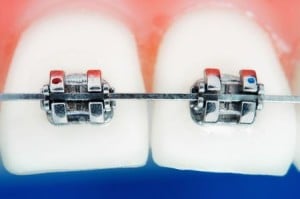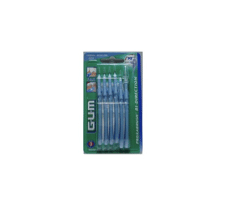
At first, your cheeks and lips might feel on the big side. The initial discomfort of adjusting to your new braces will subside with each day. You can use an analgesic or orthodontist recommended pain medication, like Advil, to help with soreness.
If you feel like your cheeks, gums or lips are irritated, try gargling a little salt-water mixture (1tsp of salt with 8oz warm water), which will help them to heal. Also, don’t fret if your teeth start to feel a little strange. It is all part of the process as the teeth begin to reposition themselves.
As was covered in our post about dental hygiene with braces, the importance of taking particularly good care of your braces cannot be overstated in life with braces. Brushing is recommended 3-5 times a day and if possible after every meal. If you can’t brush, then rinse with mouthwash and clear out any foot remnants with a proxabrush.
Try to make a travel toothbrush and a small tube of toothpaste a regular companion on your journeys. Flossing, which might take a little getting accustomed to, is a must.
Good overall dental hygiene can impact repositioning times. Healthier gums and tissue don’t offer as much resistance to moving teeth making it less painful and time-consuming for tooth movement.
You might need to give up some foods for a while. Changing your diet slightly gives your braces and teeth the best possible chance work together to result in the smile you are looking for.
Sticky, chewy, crunchy or hard foods should generally be avoided. No popcorn, hard candy, licorice or gummy bears at the movies. Apples, carrots and even corn on the cob should be left off the lunch and dinner menu, too. If you can cut or tear food into smaller pieces without having to bite into them, it is helpful too.
Wires might break periodically and you can make repairs on the fly to minimize the discomfort. Trimming the wire with nail clippers and filing it down or using orthodontic wax are viable quick fixes, but contact your orthodontist office and make an appointment to see them as soon as possible.
You don’t have to avoid or stop playing sports, either. As mouth and jaw injuries are remarkably common in sporting activity, it is recommended (by the common sense and the American Association of Orthodontists) that you get fitted for a protective mouthpiece.
If your equipment does become damaged or otherwise uncomfortable you should contact your orthodontist and make an appointment to see them ASAP.
With 8 convenient locations throughout Baltimore, Orthodontic Associates makes it easier to accommodate your scheduling needs. One of our friendly staff or accomplished doctors will make your smile (and your life with braces) our top priority!



